Politics
SDP Presidential Aspirant, Adewole Adebayo Speaks On The Newly Signed Electoral Act
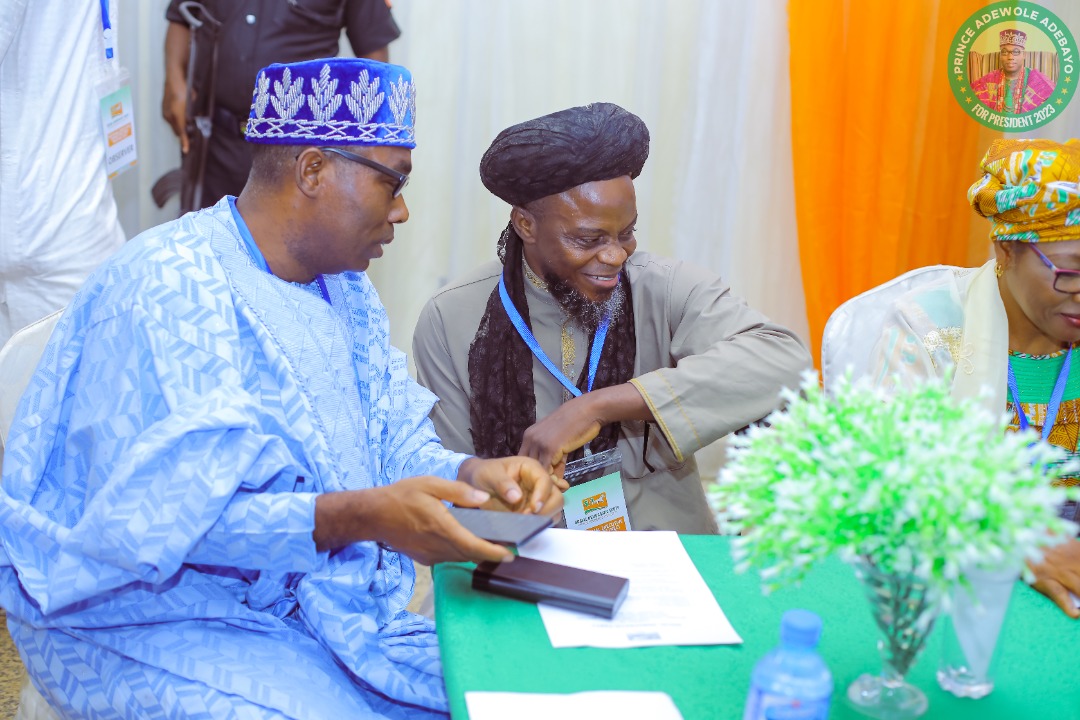
Prince Adewole Adebayo is a Presidential aspirant and new breed politician that has been in the fore front of the campaign for clean election in the country. In this interview with Correspondent OKODILI NDIDI, the Constitutional Lawyer, shares his views on the newly signed 2022 Electoral Act and other sundry issues. Excerpts
Q: As a Presidential aspirant, are you in anyway relieved by the President’s assent to the 2022 Electoral Act. Do you think it will sanitize the electoral process?
ANS: I’m relieved and pleased, relieved on behalf of the country that we shouldn’t start with uncertainty, that is what I’m relieved of. Will the President sign or will he not sign, the electoral commission, INEC was unable to publish its timetable because they did not know if they were going to work under what they like, because I think INEC prefers this scenario now to the earlier where all the burden will be on them, last minute rush, the parties will take forever to conduct their primaries and when they will conduct it, they will do it in such a shoddy and controversial manner that instead of INEC getting clear nominations, they will get Court cases and disputations. So I’m relieved on behalf of the country. I’m pleased personally as an aspirant that the investment of time, resources and the mobilization of Nigerians all have a better chance of the people’s will being reflected, so it gives confidence to those of us who are coming in to play clean politics. It gives us a very good opportunity to talk to others, who will say it doesn’t matter, they will not allow the will of the people be shown or that the ruling party is bent on rigging. So you can imagine what it would have been like if the President did not sign, this will just give life to such suspicions.
Q: one of the significant components of the of the 2022 Electoral Act is the use of technology, do you think that our political experimentation if ripe for deployment of technology or do you think it will hamper the process.
ANS: Our entire life is exposed to technology now, so I don’t think we should make fetish out of this anymore. We use technology to do every transaction, no one who is ill now who will not want to use technology to cure himself, we use technology to fly all over the place, we use it to communicate, there is nothing mysterious about election, just a voter going to the appointed place, taking a ballot paper and putting in the box. So if bankers use technology to transfer money and even Court uses technology to hold cases, I don’t see any reason there should be any mystery regarding where technology should be used in election matter, it is suitable, it is about data collection, just like any other data collection and the transmission of that same data, it is just that the stakes are high, so people are worried about whether the technology favours them or not.
So that is where the problem is, there is nothing wrong with technology, it will work, it will have the same problem like every other technology has and the backups should be the same like when any technology fails, so there isn’t anything mysterious about it. And as far as technology is concerned, there is no difference between a rural area and the city because with satellite based technology, the whole earth is the same, so I think we should just make it clear that people should embrace it am even surprised that it has not being embraced before now.
Q: Most of these amendments of the Electoral Act are actually aimed at addressing identified gaps in previous experiments, so what areas do you think the 2022 Electoral Act will address?
ANS: The Act has tried to address many of the known sharp practices and fault lines of the past but there is no law that can change human heart. There are four problems affecting our elections, legislations can address manifestations of these problems but the intensions to make these problems occur can hardly be addressed by law, it has to be addressed by other value systems and people’s investment in it. For example from my experience, we used to have a situation where the first problem was the party in power used to have a do-or-die attitude to electioneering that if they lost a single councillorship seat or House of Assembly election or House of Representatives, it was like the party was going to die, it was like the leaders were not performing, so every leader thought it was their moral duty to maim, kill, rob, trick and do whatever to win so they could convince their parties that they were strong in their stronghold that was what we started with and even the leaders of the country go around to say it is a do-or-die, you must win this so if we have that there isn’t much you can do with the law because that will lead you to the next level.
The next level is that the leadership and the operation of the Electoral Commission was meant to reflect the do-or-die mood of the leadership, such that even in the selection of the Commissioners in the operation of their commission and the measures and activities they were putting in place, it was interpreted as whether they were loyal to the government, so if INEC was to do anything that was likely to bring popular participation, it was like you are betraying the person who appointed you, so that mentality of look for someone who is going to be loyal to you, who is going to carry out your do-or-die wishes made the Commission to have that attitude where they themselves were bringing within the Commission booby-traps for themselves, that’s the second part. The third part is the participants themselves, politicians were putting too much high stakes in the election, you will notice politicians selling their houses, borrowing money from banks, doing all sort of things. So the stake is not about let the wishes of the people be done, it was battle that could have been fought with guns and tanks now being fought through the ballot. So it made everyone desperate to a point where they could pay any amount of money to any official of the Commission, they could organize with law enforcement agencies, so this war-like approach could not have being addressed by the Electoral Act because the Act is there but every stakeholder believes that all is fair in war. The fourth problem was a point where the people reached and they stop being stakeholders in their own democracy, at a time where these people become a troublesome lot, during election time they come and scatter everywhere and once they win they take all the money and benefits to themselves. So we have to react in two ways, one, apathy, we are not interested, just stay at home and if you are a young man and you are associating with politicians, your parents will tell you to keep away from politics, it is not a good thing, if you are a professional doing well in your profession and you indicate interest to serve the public, people we say what are doing, don’t go there, don’t you see are well settled your life is, do you want to go and ruin it, so the public did not have interest in it.
Another was that the few who have interest, have cynical interest, they will say let me go and make my money, let me sell my vote, let me be a thug and collect something because it is a money making venture, so this intensions, we may have had improvements but some still harbour them so in this situation, what the Electoral Act has done is to pick examples, lessons from activities in the past which represented these fundamental mindset that I have explained but it has not addressed the mindset because there is no law that can go to the minds of the people and say if you are in government, you are serving the public, forget do-or-die affair, you can’t do anything, you can only say do-or-die people in government tend to do this or that, then you make the law so well written that it can stop them from doing their worst excesses, OK you give oath of neutrality to INEC official, you strengthen the law against bribery, you remove the anthropomorphic aspect from it where human contact is replaced with technology, all these idea of trying to adopt technology is to remove temptations from INEC functionaries, whether fulltime or ad-hoc because if you have election declared at the polling unit, you can use your finger to count the result but between the polling unit and the collation centre, you see that people complain that these numbers have been forged, people are defrauded and fake results are announced, the Courts have to now choose between two liars, the one lying a little and the one lying a lot so that’s how the election tribunals have to do with it and in some instances the election tribunals themselves get compromised or get misled or make honest mistakes and they will go on appeal and eventually we have all these problems. So the use of technology is aimed to help us to eliminate the possibility that someone can use his discretion or mischief to change something.
Q: Still on the issue of legislation, we have seen electoral offenders walk away with their victory, without strong laws to bring them to book and they are taking advantage of this to subvert the process. What do you think should be done?
ANS: It is like this; you remember when you were in the primary school they will appoint a pupil, the teacher will go away and say write down the names of noisemakers that list never reflected on anybody’s result because it wasn’t taken seriously because sometimes when the teacher returns the pupil who was asked to write the names of noisemakers will be the loudest noisemaker at that point or write the names of people who did not give him part of their lunch or who didn’t show friendliness so it was on rare occasion you found someone who is really doing it.
The people who are supposed to enforce the law are the people who are the electoral offenders themselves that is why it hasn’t worked because if you read elections petitions, I have spent twenty years in my life filing petitions, defending petitions and all of that, infact in one of the Presidential election petitions, the party that lost, wrote that the Police thump printed ballot papers, that Police killed people, the Police snatched ballot boxes, who is supposed to enforce electoral Act, the Police. So if the Police is the offender, if the Attorney General is a stakeholder, if the INEC Commissioner who is representing the Commission is accused of fraud, if the REC is said to be working with the governor or something, so this is an elite crime and all over the world, elite crimes hardly get punished, that is why a person is more likely to be jailed for stealing a bicycle than for ruining a bank.
So electoral offences are elite crime it is only when the people are in control of the polity that they can force the elites to punish one another for their crimes, so don’t let us go to the back end, which is electoral offences, when it happens how to punish it, no, what you should do is to prevent the crime from being committed to start with and this Electoral Act 2022 is doing more of prevention and it is also given evidence but what I tried to do for INEC, I wrote their first Electoral Offences Draft Bill and I still have and I still have a copy with me. I wrote it for them in 2006, it was meant to allow for prosecution of electoral offences the way an individual can prosecute election petition. So if I can allege in an election petition that somebody snatched a ballot box or somebody altered Form EC8 or someone committed one crime or the other, if I can allege it in an election petition and I am allowed to lead evidence, it is just that I have to lead evidence meets the threshold of criminal conviction, it cannot be by balance of probabilities, which is what the civil Act requirement is, I have to do it and prove it beyond all reasonable doubt.
If I am able to do that, why will I not be able to obtain automatic statutory fiat to prosecute anyone who is found to have committed an electoral offence. So if you want to do that, once you know that if you go to a community and you snatch a ballot box and you run away, you’re caught on video and there are witnesses, any person who is a contestant in the election can automatically rely on the Act and have you prosecuted for it. Then the perpetrators will not have the monopoly of prosecution and the second leg of it is that the Commission itself would have like the EFCC, a prosecution department.
The problem with that is that for INEC to be able to do that, they have to rise above board because in many judgments of Court of Records, there indictment of INEC officials and INEC itself, so it is asking one of the co-offenders to prosecute the others, so this is the colnoldrom that we have when it comes to the issue of prosecution because you also have to guide against the weapon being weaponized against contestants that they don’t like, so that why it is more of preventive measures in the Electoral Act, makes it easier to use technology which is unbiased. So all of these measures will not excuse the most important component, which is the people themselves have to demand a clean election and have to invest their minds, time and energy in ensuring that they contribute in making that happen but where something is a crime in the book but it is socially accepted, it cannot be a crime in real life.
Q: The issue of endorsement of people seeking public offices by a cabal has become synonymous with our electoral process, when are we going to have elections that will reflect the power of the electorate?
ANS: This is the way I understand it, in a democracy, there are many stakeholders and in a participatory democracy there are many shades of opinion. Campaigning requires you consulting and exchanging ideas with different shades and in matters that are ideological or based on principles or based on interest and sentiments, there are opinion leaders who people know as aggregating their own consciousness and there are classes, so if for example, I have certain radical views as I do have and am a new person, those who have vested interest in the country, industrialists will say we are concerned that this young man who is just fifty years old maybe he doesn’t understand the efforts we made to put all of these things in place in the country and he is going to come impatiently and scatter what we are doing, he may not know what we put in to run these industries he may come up with a physical or monetary policy that is going to disrupt productivity so I can go to the Chamber of Commerce and talk to the leadership, I can go to the stock exchange and talk to the market, I can go to the bankers’ committee and talk to the bankers and I can go to Nigerian Manufacturing Association and talk to them. So when you are doing this, they will explain to their members that they have met with him and he understands our position and he knows the risks attendant to our industry and our contributions to the economy, his policies are not against the market. If there are political leaders who agragate the feelings of certain categories, you go to them and talk to them as well and say this is what I want to do. In the case of ours where we have diversity in ethnicity, diversity in religious beliefs and these issues are in the front burner then for me and my personal experience, even things that you think you know, when you meet with these opinion leaders, you will understand why they are leaders to start with. Why did people allow them to be their leaders, because to you who don’t belong to that group, you don’t know what that leader is doing for his people and they need him, everybody should be able to pray for themselves, so why do they need the Bishops, the Sheiks and so on but when you come across these leaders, you would understand the concerns of their members and the data that they collect on daily basis on issues that can easily be assuaged by simple explanation but which nobody is offering any, they have to be the ones comforting their members. So when you interact with them, you can see that as a leader, I can solve these problems easily because now I am aware of them and many people who have been in office don’t get to be aware of these issues until after they have left or it is too late. So same thing where you are talking to former leaders of the country, you want to learn from them why was it difficult for them succeed in what looked so simple, because I ask more questions than I ask them to do anything for me. I was with General Gowon at a book lunch and I looked at it, this a man of peace, how did a man of peace end up with a civil war, what went wrong. This was a man that had everybody with great ideas, from Awolowo to Aminu Kanu to Shehu Shagari to Anthony Enahoro and so on and so forth working with him, these were the brains of Nigeria who were contesting against one another in the first republic, they were all under him (Gowon), he was presiding over them but what happened, he was a man who was reluctant to take office, he had to be taken to rule by gunpoint but he had to be chased by gunpoint too. So these are all the things that we go to learn, because to be President of Nigeria is a very complex thing, it is not the way people look at it, the Presidency of Nigeria is a very steep responsibility, it is a very weighty responsibility, it is an office of sorrow and tears, even outwardly, it looks like pump and pageantry, because every decision you take is consequential and affects millions of people for a long stretch of time and any mistake is opportunity lost for generations unborn. So it is not a place you go to with gap in your mind, you should minimize the surprise that you will find there and you also have to remember that you are human and the frailty of human has affected other people, why would you expect your own to be an exception, so you must quickly learn from them, where arrogance led to hubris.
Q: Recent elections have been marred by voter apathy, which has been attributed to loss of confidence in the electoral process by the people, with the passage of the 2022 Electoral Act, which promises to protect the process, what is your message to Nigerians?
ANS: my message to Nigerians is for everyone to be a participant, I know it is hard but you have to be a participant and the most powerful people are the voters, even though they don’t realize it in many cases, but what makes to know that you are very important is that when all the noise making has been done, rallies have been held and all kinds of jamboree have taken place, on the day of the election, everything is quiet, it is now left to the voter and their conscience. So if our people start to participate from the beginning and start to interrogate politicians, I know it is easy to say these things but very hard to do it, but we have to do it because once you do it, you have peace. People have to by themselves desire a free and fair election, it has to be one of their prayers points because how I get to know that Nigerians want something is when they put it in prayer. So when a free and fair election becomes the prayer point of Nigerians and they demand it and to be free means to be free from violence, disruptions and all of that. To be fair means that you give each person an opportunity to play by the rules and some of the rules are in the hands of the government, like the Electoral Act which President Buhari could have refused to sign or the National Assembly could have refused to pass, those are governmental actions. Government may decide to starve INEC of funds or even send unworthy Commissioners to the place, all are in the hand of the government. The next is in the hand of the party leader, because some of the greatest criminals in Nigerian politics are party leaders. They operate with criminal intent most of the time, they do not work for their parties, they become blackmailers and racketeers and collect money from all shades id people, miscarry their primaries, have it lopsided in one person and do all sort of things and right from the primaries, problem starts. Then the politicians themselves, many know they are not popular and they have lost hope of being popular but they want to use money to do it, not just money to campaign but money to cause mischief, to buy the security agencies, to buy some INEC people and all of that. Now, the last set are the people, to be honest, even though am seeking votes and I need to be respectful and gentle to the public, we have to say the truth, the man who is saying I have my PVC and am going to sell it, is also a criminal because it is against the law and such a person cannot say, well it was hunger, whatever situation, a Policeman will say the same thing if he allows you get away with the excuse that it was hunger, he can say well I haven’t paid my children school fees, so I collected money too and the INEC official will say the same thing and the politician will say I borrowed the money so I need to win at all cost. So we need to talk to our people and what I have observed in recent elections is that a lot of people went to sell their votes, so if the people who are the least powerful individually but most powerful collectively, throw away their power and sell it for N3,000.00, why will you go and blame the politician then, so I think that same way people will be reluctant to sell their children, reluctant to sell their school certificates, the same way they should be reluctant or even rule out the idea of selling their votes. So if we have all of these desires, then we are going to have a very much improved electoral outcome and it is not just for the day of election or the day after when the result is announced, it will signal to the politician that come what may, whatever you do, the people desire good government, so while they are in office, they will not say steal all the money, it doesn’t matter if you do project because you can always buy the votes, they will say look nobody is going to accept your money, you will have to show that you have done well and it will help us to do well. It will also improve the quality of people who come to contest because some people like us can never buy votes, that word never is in capital letter, because we are not going to commit crime to get into office, so it will encourage more people like me, if they that they have an electorate that is ready to accept them or reject them on the basis of what they present, they will come out and give it a chance but if it is bazaar and an auction, they are not going to come out because many people who have good ideas don’t necessarily have the money and many who have the money have worked hard for the money honestly and they have lived honestly up to the point of running for an election, they are not going to ruin their character and legacy because they want to win an election and go and serve the public. So if these stakeholders, the government, the Electoral Commission, the politicians, the party leaders and the membership of the political parties and the contestants and finally the people, if they all desire and work towards a clean election, we will have a clean election, even without this Electoral Act, we could have had a clean election but with it now, whatever we desire to do is now being facilitated for us by this Electoral Act, it makes it possible for those who are willing to work for clean election to so, it also removed the excuses of those who were cynical, who will say am not trying because even if I tried the hardest, it will still not work. It also gives the Judiciary teeth because many of the amendments arose from studying judgments of the Court, when the Judge will say well what has been done is bad but our hands are tied because the Electoral Act did not say we can do anything about it and this Card Reader is INEC innovation but it is not backed by law, now everything is backed by law, so the judiciary has no excuse to miscarry justice because as a full practicing Lawyer I can tell you that on many occasions the Judiciary has miscarried justice by obeying the law and you cannot blame the Judiciary because they are to do justice according to the law and not justice according to the truth. So they’ve been doing justice according to the law, the law now is closer to truth, it will make it easier for an adjacency to occur between them doing justice according to the law and justice to truth because when truth and law approximate, the Court finds it easier, that’s why when you hear or read some judgment of the Supreme Court, Nigerians put their hands on their heads and say what is this abomination, it is abomination according to law, so that is why we were making efforts and you would have noticed that last year October, we gathered together and made speeches, you heard what I said regarding this Electoral Act, what Attahiru Jega said and some other people when we were calling on the National Assembly to pass the Electoral Act but I went beyond to say that passing the Electoral Act is addressing past mischief, it cannot address future mischief, so their might be a coven of mischief makers meeting now and studying the Electoral Act critically with a view to no complying, that they will find some loophole somewhere, so instead of snatching ballot box, you snatch the electronic machine, so we need to be vigilant and the leadership of the security agencies have to realize that we need to have a country to speak of before you can buy houses with election money, so that is why we need to know that the Electoral Act will not make any much difference if we do not change our attitude. We have amended the law but if you don’t amend your behaviour, there is no law, you can see how simple the ten commandment given to Moses by God is, did they obey it, no, so we need to bring the moral and ethical component to it, if we don’t, we will start blaming the Electoral Act, I like this one that we have now, it is much better than the 2010 Electoral Act, but I have been saying it the 2010 Electoral Act was enough for honest people, patriotic people. In Nigeria you don’t make your laws for patriots, you make your laws for criminals that these people have no ethics, no conscience and no sense of duty, so you make law for everything but in spite of you making your law so complex, there is always a however somewhere and that however somewhere, is what we need to use moral persuasion to do. If we don’t address the moral component, the implementation of the Electoral Act will have challenges.
Q. If you win and emerge Nigerian President in 2023, where will be your point of take off?
ANS: First, once elected, even before I assume office, I will do the three functions given to me, the President of Nigeria, has three mandates, he is a missionary with three missions. He has the Head of State Mission, because we don’t have another Head of State, the President is the Head of State, it is unlike the First Republic where we have a Prime Minister and the President, so his first duty is to be father to the whole nation. So even before inauguration, I will make sure that I consult with every shade and opinion in this country, so that the tension and division that we have now will die down, I will meet with every one of the stakeholders, regional, ethnic, religious, classes, groups so that they know that their joy is my joy an d their pain is my pain and that every person has a stake and access to my presidency.
Secondly, is to get myself ready as the Chief Executive, ready to take office from day one so that half of my presidential initiative for the four years will be inaugurated on the day of my inauguration, very short inauguration and straight to the office to work for the first twenty four hours without stopping to ensure that I have my cabinet list ready and on that day Nigerians will know their portfolio if they pass screening and clearance.
-

 News6 days ago
News6 days agoVideo: Officer, Residents Injured As Police, NSCDC Clash In Osogbo
-

 Metro/Crime4 days ago
Metro/Crime4 days agoLady Allegedly Killed By Her Online Lover
-

 News1 day ago
News1 day agoPresident Tinubu appoints Acting Chief of Army Staff (Photo)
-
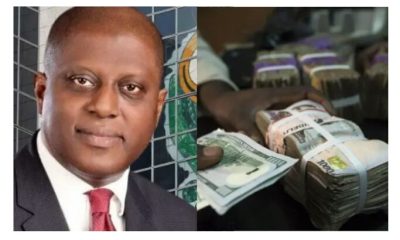
 Business7 days ago
Business7 days agoOld Naira Notes: CBN speaks on deadline
-

 Weird News2 days ago
Weird News2 days agoTwo RCCG Pastors Suspended For Engaging In Same-Sex With Church Members
-
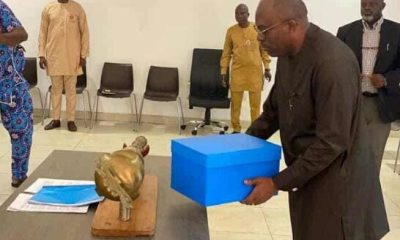
 Politics1 day ago
Politics1 day agoFubara breaks silence as Court stops FG allocation to Rivers
-
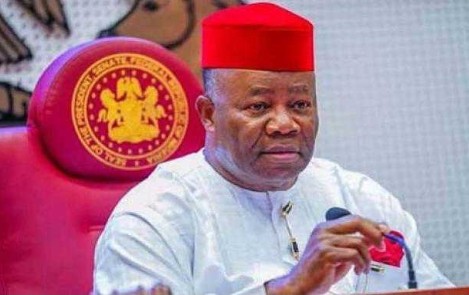
 Politics7 days ago
Politics7 days agoSenate president, Akpabio gets new appointment
-
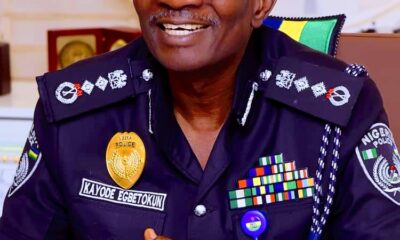
 News4 days ago
News4 days agoGroup Slams Police Over Arrest of Peace Corps Commandant




